Field Engineer Resume Examples

Jul 18, 2024
|
12 min read
Crafting your field engineer resume: putting your skills in the spotlight. Learn how to highlight your experience and qualifications to stand out from the crowd. Engineers need structure—and so does your resume!
Rated by 348 people
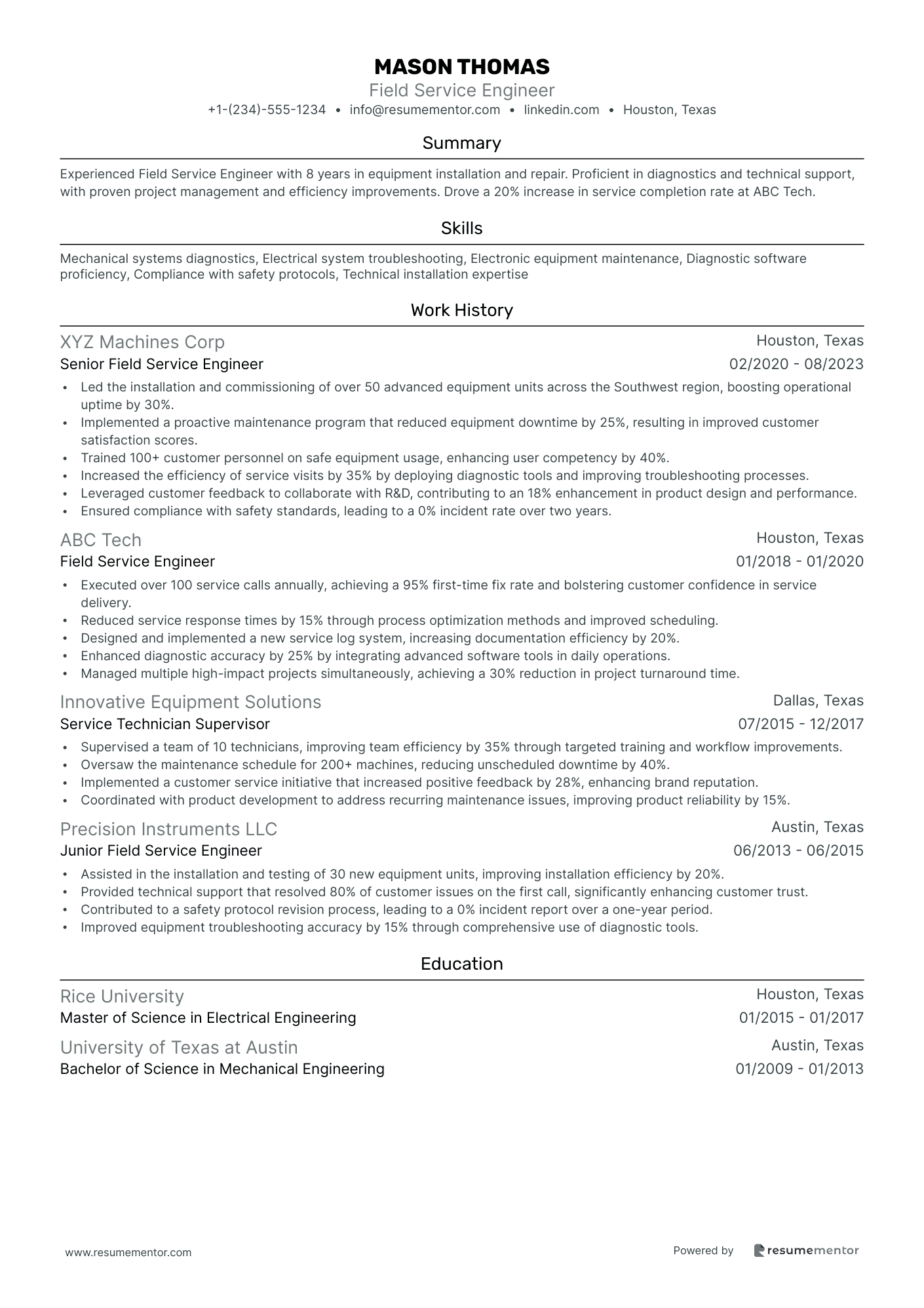
Field Service Engineer
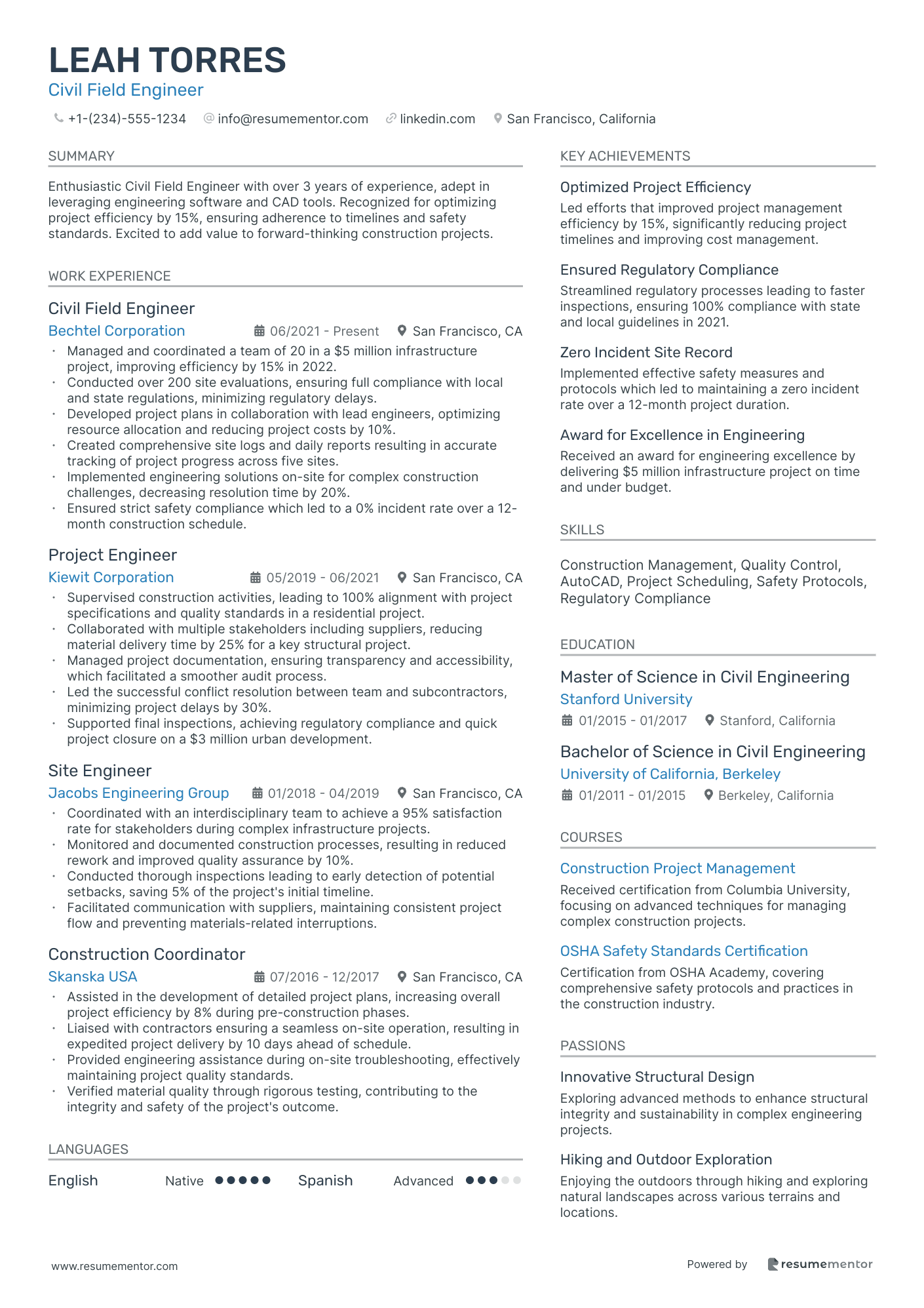
Civil Field Engineer
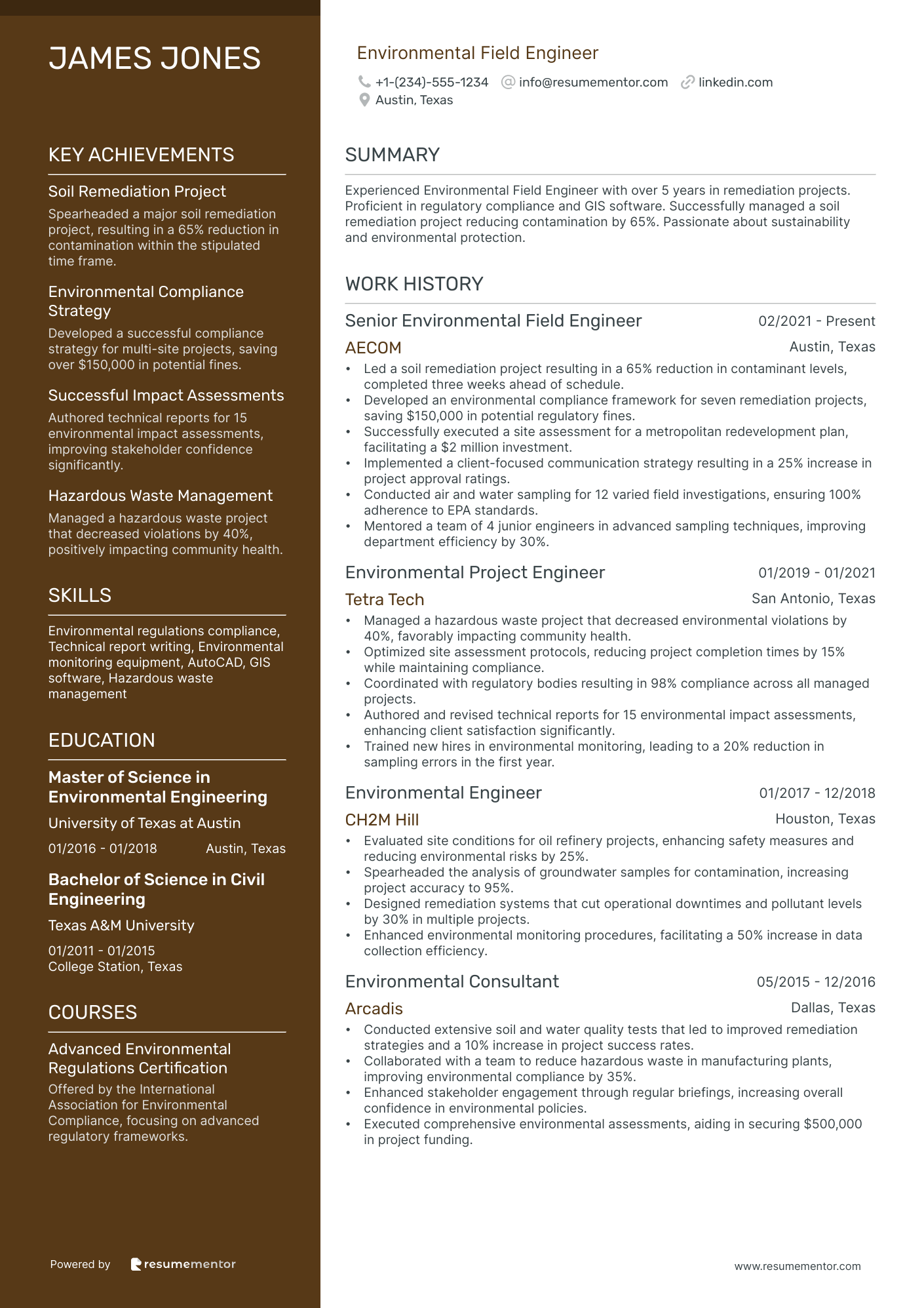
Environmental Field Engineer
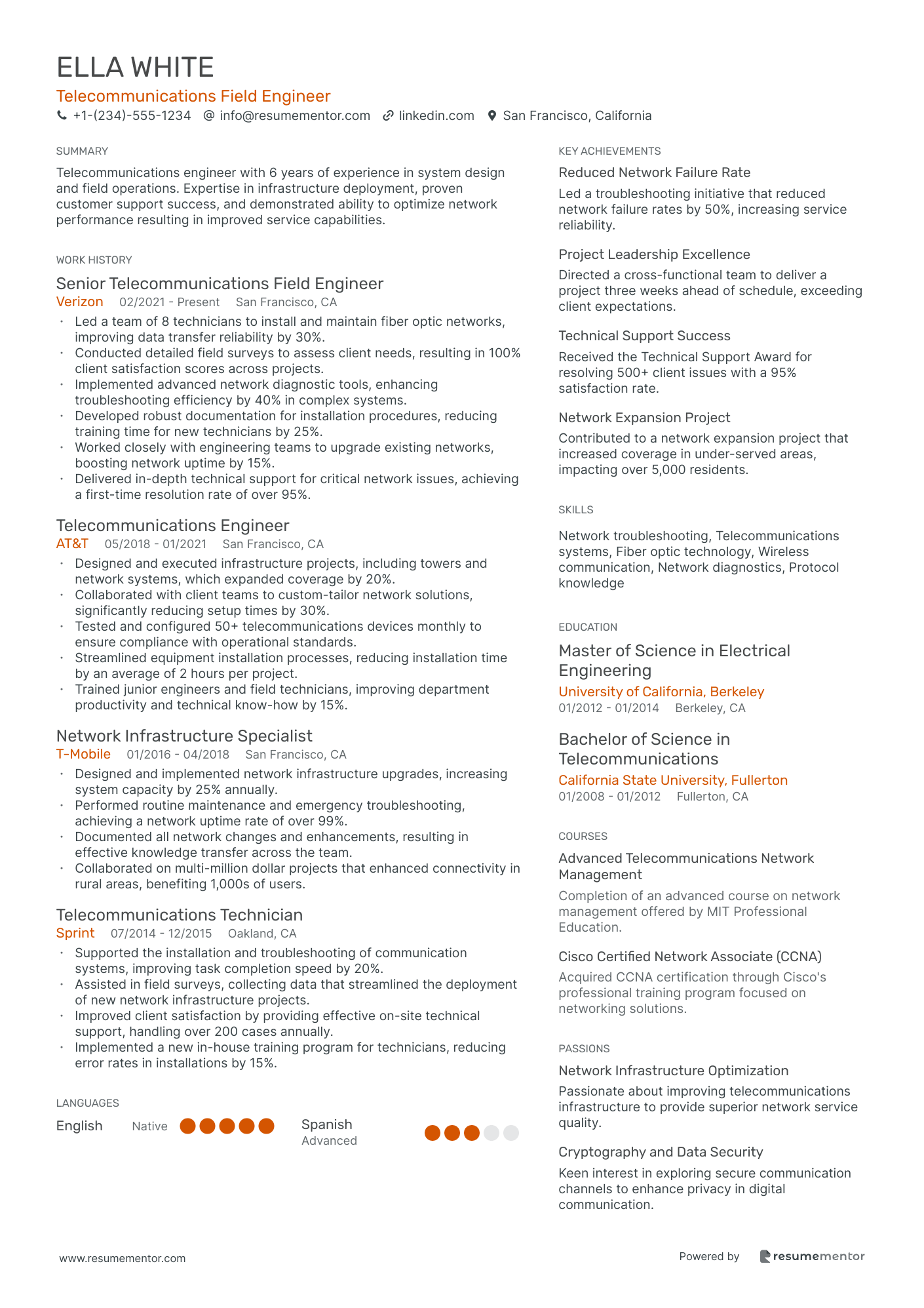
Telecommunications Field Engineer
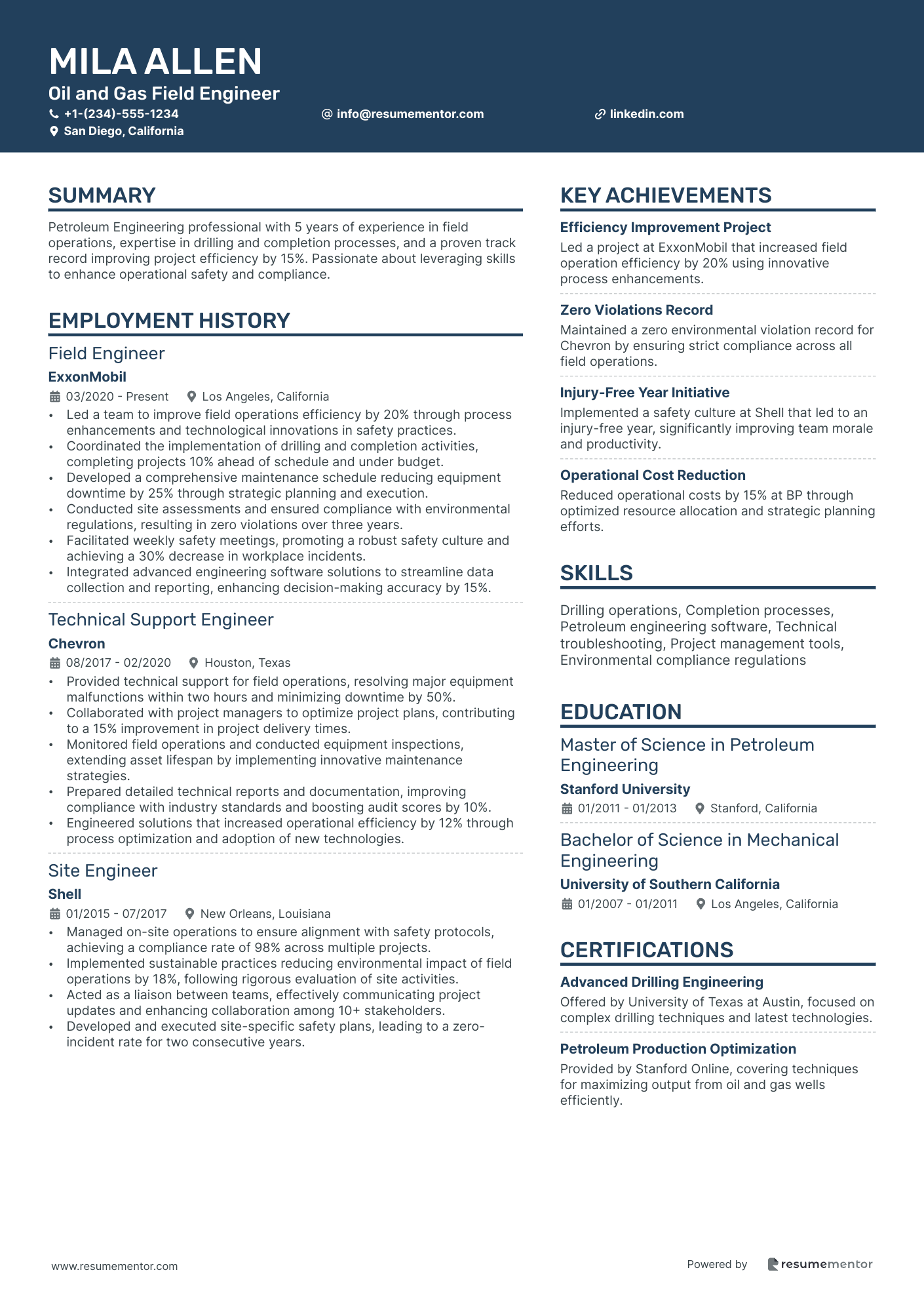
Oil and Gas Field Engineer
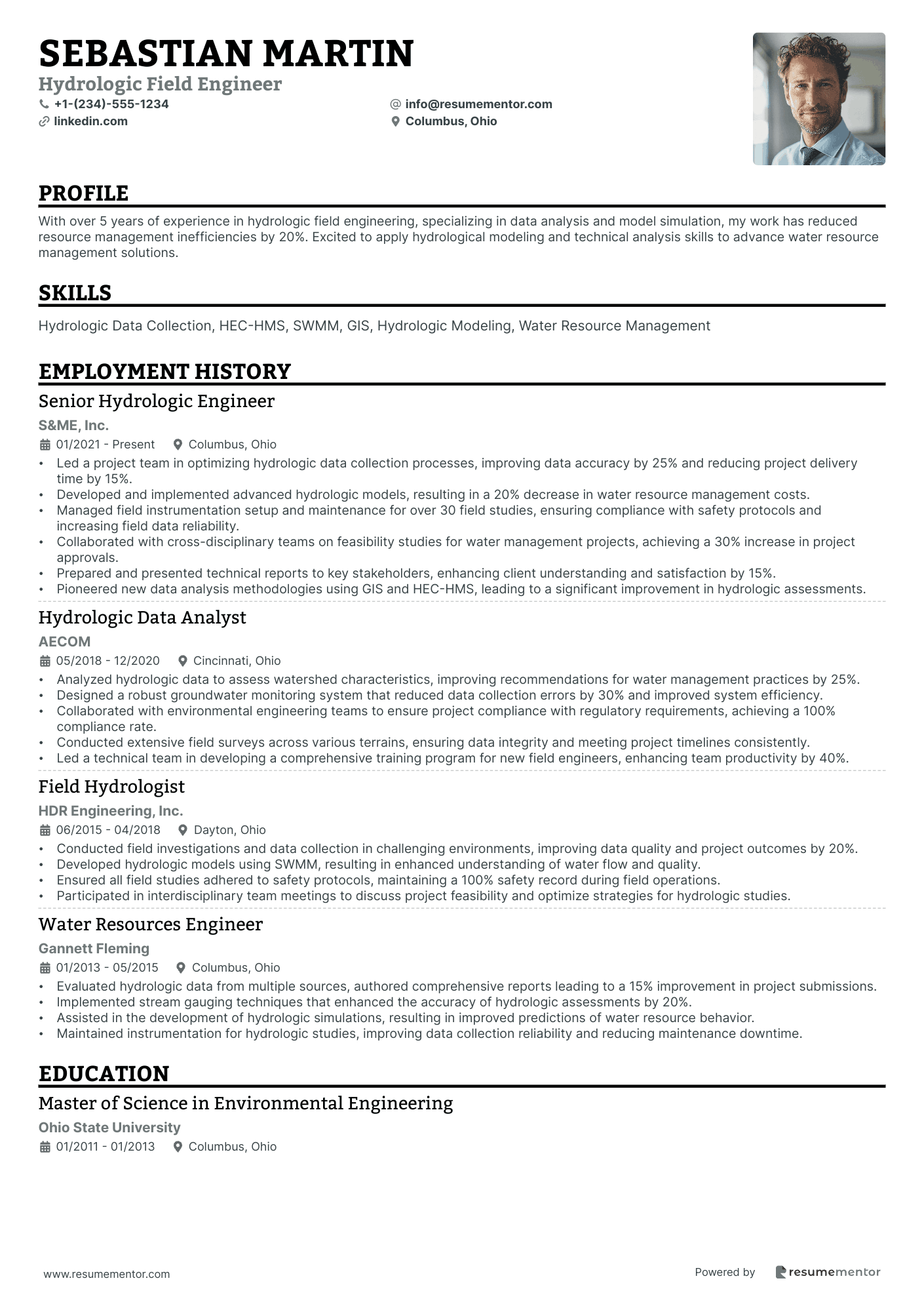
Hydrologic Field Engineer
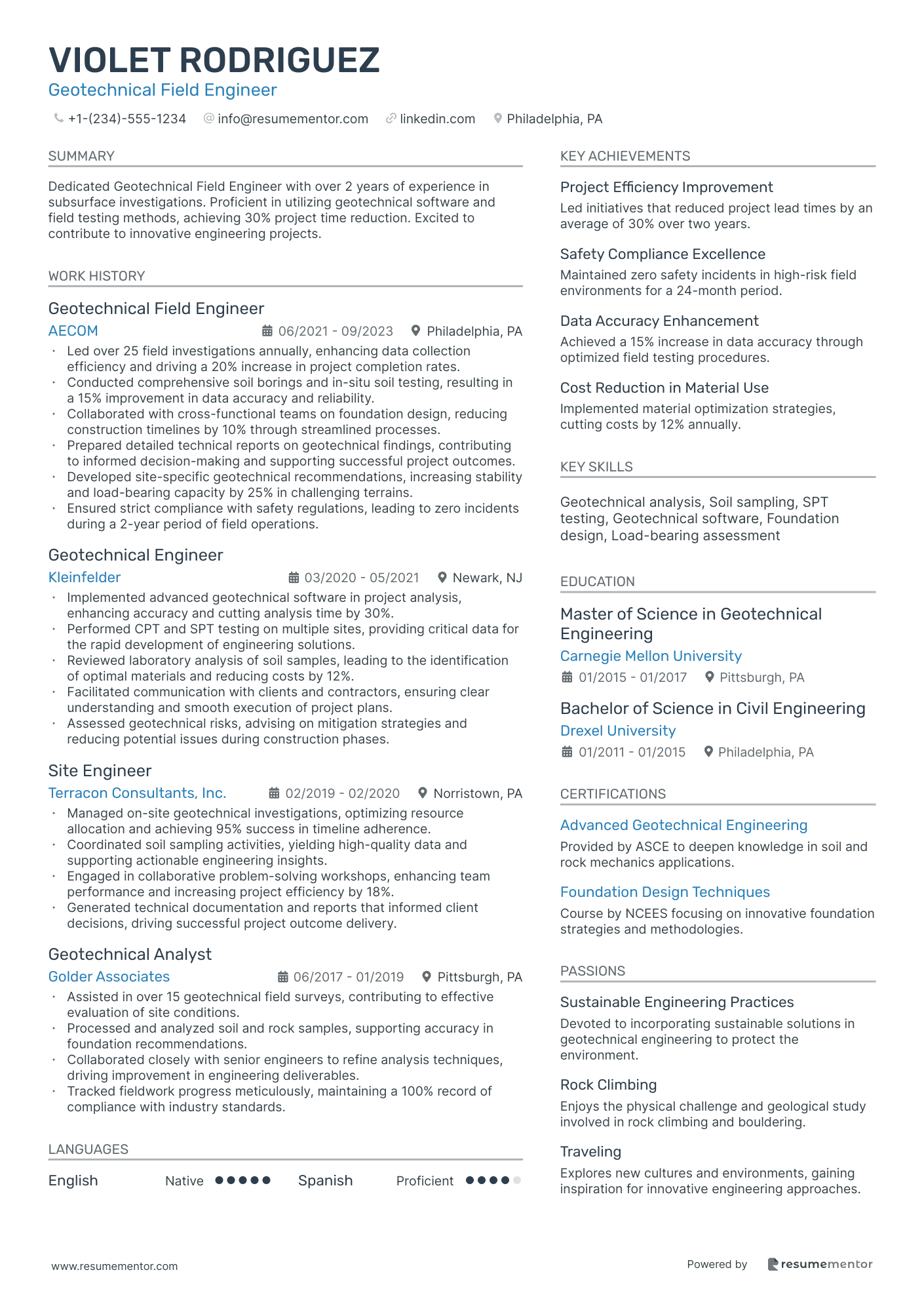
Geotechnical Field Engineer
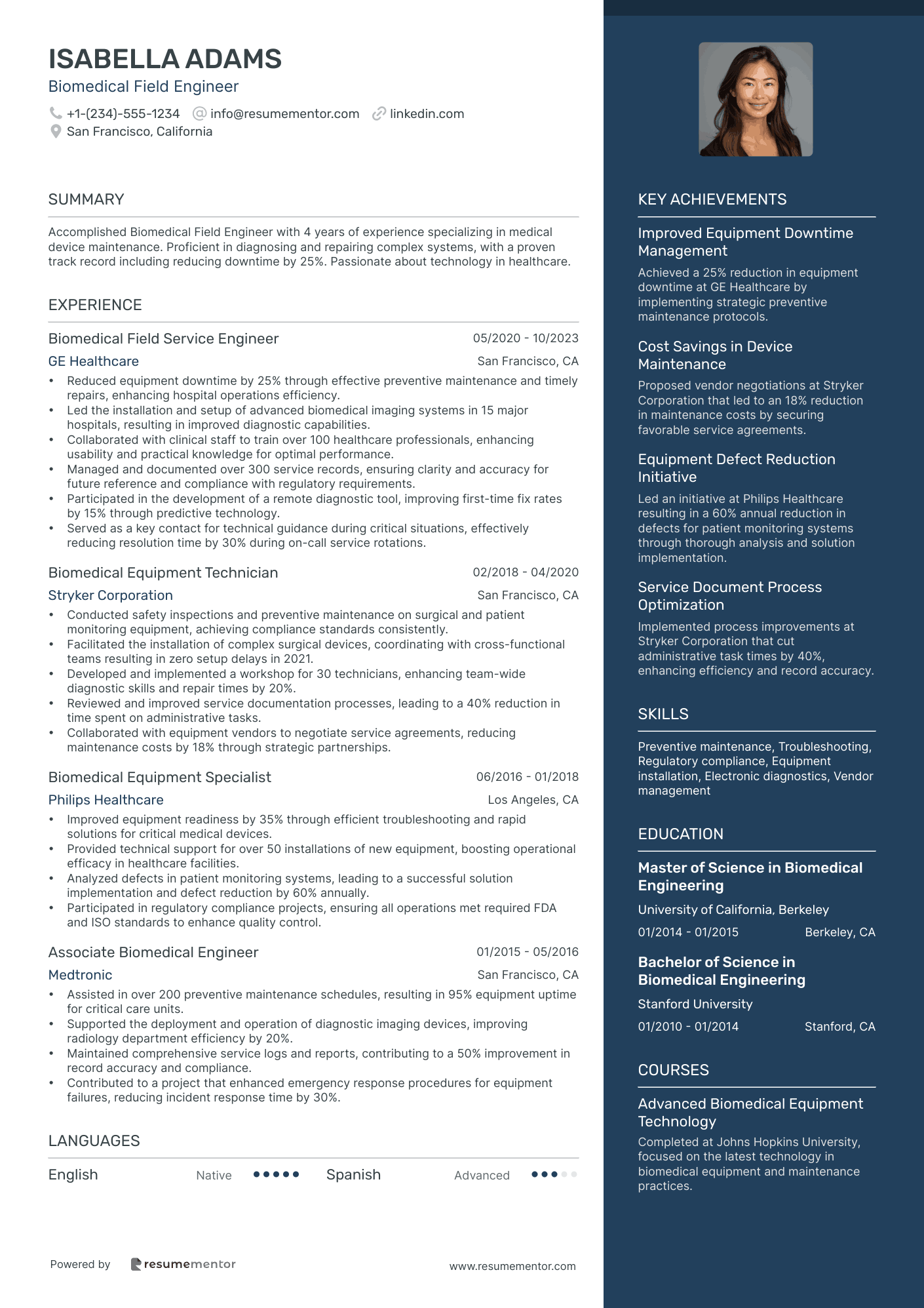
Biomedical Field Engineer
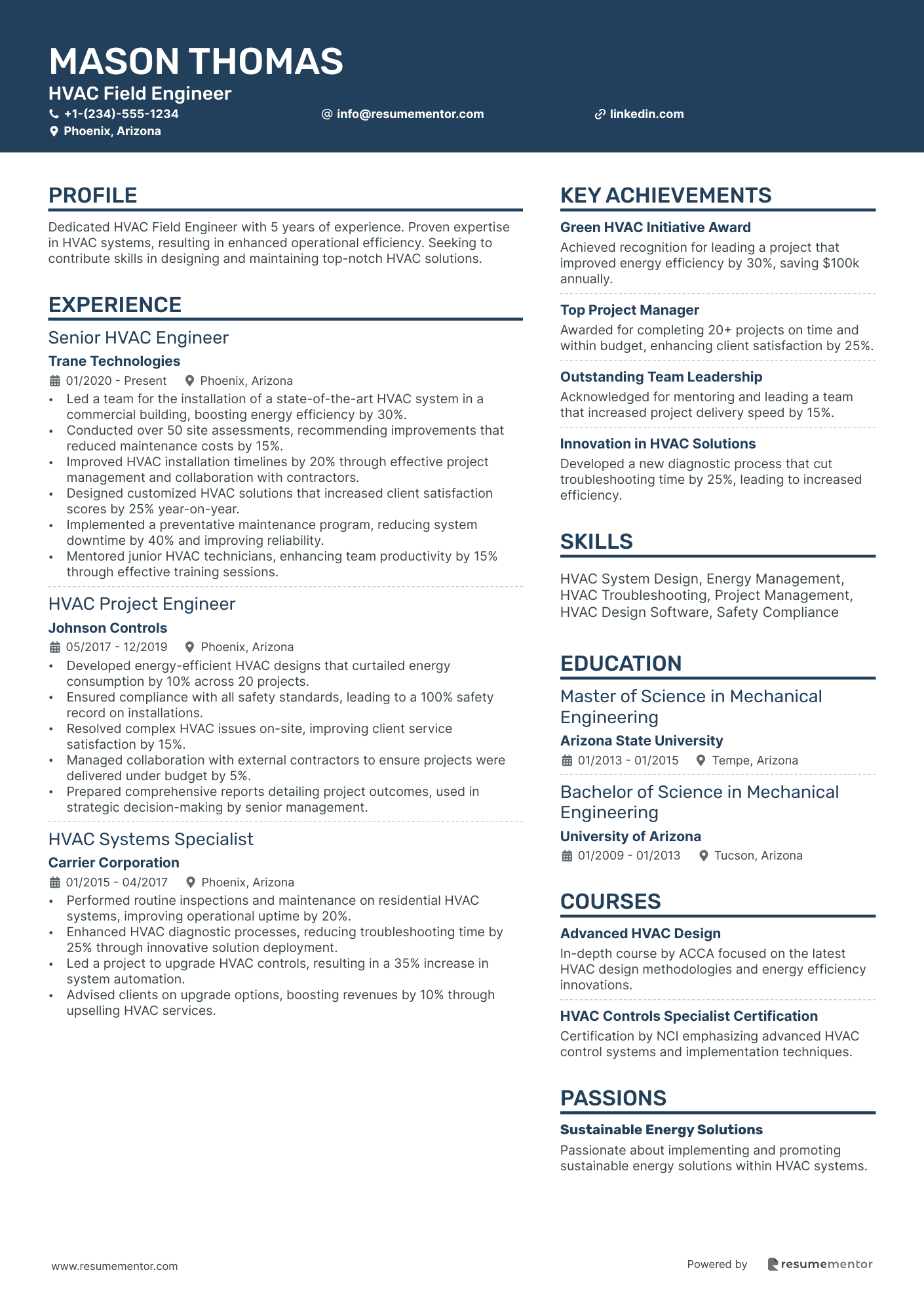
HVAC Field Engineer
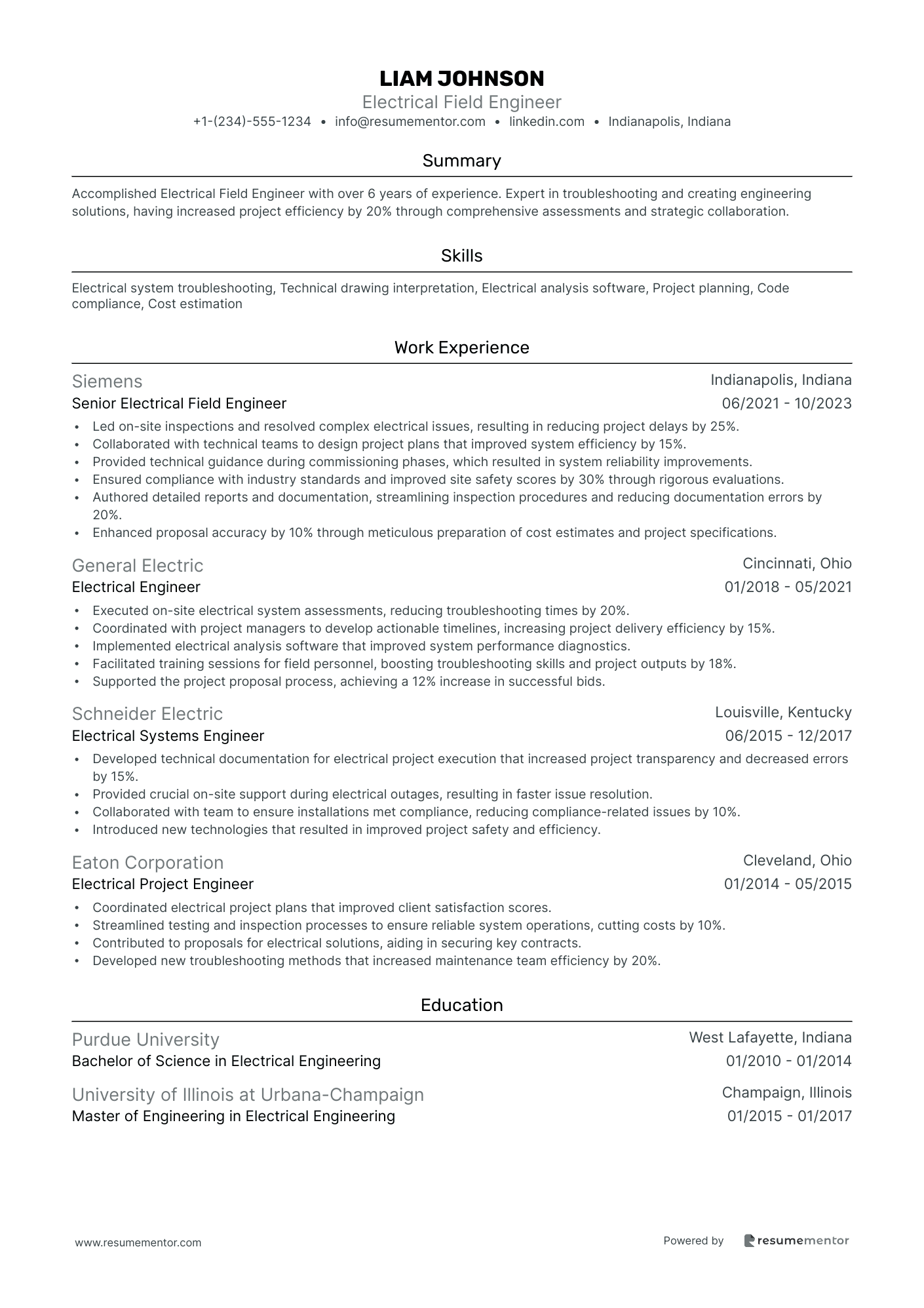
Electrical Field Engineer

Field Service Engineer resume sample
- •Led the installation and commissioning of over 50 advanced equipment units across the Southwest region, boosting operational uptime by 30%.
- •Implemented a proactive maintenance program that reduced equipment downtime by 25%, resulting in improved customer satisfaction scores.
- •Trained 100+ customer personnel on safe equipment usage, enhancing user competency by 40%.
- •Increased the efficiency of service visits by 35% by deploying diagnostic tools and improving troubleshooting processes.
- •Leveraged customer feedback to collaborate with R&D, contributing to an 18% enhancement in product design and performance.
- •Ensured compliance with safety standards, leading to a 0% incident rate over two years.
- •Executed over 100 service calls annually, achieving a 95% first-time fix rate and bolstering customer confidence in service delivery.
- •Reduced service response times by 15% through process optimization methods and improved scheduling.
- •Designed and implemented a new service log system, increasing documentation efficiency by 20%.
- •Enhanced diagnostic accuracy by 25% by integrating advanced software tools in daily operations.
- •Managed multiple high-impact projects simultaneously, achieving a 30% reduction in project turnaround time.
- •Supervised a team of 10 technicians, improving team efficiency by 35% through targeted training and workflow improvements.
- •Oversaw the maintenance schedule for 200+ machines, reducing unscheduled downtime by 40%.
- •Implemented a customer service initiative that increased positive feedback by 28%, enhancing brand reputation.
- •Coordinated with product development to address recurring maintenance issues, improving product reliability by 15%.
- •Assisted in the installation and testing of 30 new equipment units, improving installation efficiency by 20%.
- •Provided technical support that resolved 80% of customer issues on the first call, significantly enhancing customer trust.
- •Contributed to a safety protocol revision process, leading to a 0% incident report over a one-year period.
- •Improved equipment troubleshooting accuracy by 15% through comprehensive use of diagnostic tools.
Civil Field Engineer resume sample
- •Managed and coordinated a team of 20 in a $5 million infrastructure project, improving efficiency by 15% in 2022.
- •Conducted over 200 site evaluations, ensuring full compliance with local and state regulations, minimizing regulatory delays.
- •Developed project plans in collaboration with lead engineers, optimizing resource allocation and reducing project costs by 10%.
- •Created comprehensive site logs and daily reports resulting in accurate tracking of project progress across five sites.
- •Implemented engineering solutions on-site for complex construction challenges, decreasing resolution time by 20%.
- •Ensured strict safety compliance which led to a 0% incident rate over a 12-month construction schedule.
- •Supervised construction activities, leading to 100% alignment with project specifications and quality standards in a residential project.
- •Collaborated with multiple stakeholders including suppliers, reducing material delivery time by 25% for a key structural project.
- •Managed project documentation, ensuring transparency and accessibility, which facilitated a smoother audit process.
- •Led the successful conflict resolution between team and subcontractors, minimizing project delays by 30%.
- •Supported final inspections, achieving regulatory compliance and quick project closure on a $3 million urban development.
- •Coordinated with an interdisciplinary team to achieve a 95% satisfaction rate for stakeholders during complex infrastructure projects.
- •Monitored and documented construction processes, resulting in reduced rework and improved quality assurance by 10%.
- •Conducted thorough inspections leading to early detection of potential setbacks, saving 5% of the project's initial timeline.
- •Facilitated communication with suppliers, maintaining consistent project flow and preventing materials-related interruptions.
- •Assisted in the development of detailed project plans, increasing overall project efficiency by 8% during pre-construction phases.
- •Liaised with contractors ensuring a seamless on-site operation, resulting in expedited project delivery by 10 days ahead of schedule.
- •Provided engineering assistance during on-site troubleshooting, effectively maintaining project quality standards.
- •Verified material quality through rigorous testing, contributing to the integrity and safety of the project's outcome.
Environmental Field Engineer resume sample
- •Led a soil remediation project resulting in a 65% reduction in contaminant levels, completed three weeks ahead of schedule.
- •Developed an environmental compliance framework for seven remediation projects, saving $150,000 in potential regulatory fines.
- •Successfully executed a site assessment for a metropolitan redevelopment plan, facilitating a $2 million investment.
- •Implemented a client-focused communication strategy resulting in a 25% increase in project approval ratings.
- •Conducted air and water sampling for 12 varied field investigations, ensuring 100% adherence to EPA standards.
- •Mentored a team of 4 junior engineers in advanced sampling techniques, improving department efficiency by 30%.
- •Managed a hazardous waste project that decreased environmental violations by 40%, favorably impacting community health.
- •Optimized site assessment protocols, reducing project completion times by 15% while maintaining compliance.
- •Coordinated with regulatory bodies resulting in 98% compliance across all managed projects.
- •Authored and revised technical reports for 15 environmental impact assessments, enhancing client satisfaction significantly.
- •Trained new hires in environmental monitoring, leading to a 20% reduction in sampling errors in the first year.
- •Evaluated site conditions for oil refinery projects, enhancing safety measures and reducing environmental risks by 25%.
- •Spearheaded the analysis of groundwater samples for contamination, increasing project accuracy to 95%.
- •Designed remediation systems that cut operational downtimes and pollutant levels by 30% in multiple projects.
- •Enhanced environmental monitoring procedures, facilitating a 50% increase in data collection efficiency.
- •Conducted extensive soil and water quality tests that led to improved remediation strategies and a 10% increase in project success rates.
- •Collaborated with a team to reduce hazardous waste in manufacturing plants, improving environmental compliance by 35%.
- •Enhanced stakeholder engagement through regular briefings, increasing overall confidence in environmental policies.
- •Executed comprehensive environmental assessments, aiding in securing $500,000 in project funding.
Telecommunications Field Engineer resume sample
- •Led a team of 8 technicians to install and maintain fiber optic networks, improving data transfer reliability by 30%.
- •Conducted detailed field surveys to assess client needs, resulting in 100% client satisfaction scores across projects.
- •Implemented advanced network diagnostic tools, enhancing troubleshooting efficiency by 40% in complex systems.
- •Developed robust documentation for installation procedures, reducing training time for new technicians by 25%.
- •Worked closely with engineering teams to upgrade existing networks, boosting network uptime by 15%.
- •Delivered in-depth technical support for critical network issues, achieving a first-time resolution rate of over 95%.
- •Designed and executed infrastructure projects, including towers and network systems, which expanded coverage by 20%.
- •Collaborated with client teams to custom-tailor network solutions, significantly reducing setup times by 30%.
- •Tested and configured 50+ telecommunications devices monthly to ensure compliance with operational standards.
- •Streamlined equipment installation processes, reducing installation time by an average of 2 hours per project.
- •Trained junior engineers and field technicians, improving department productivity and technical know-how by 15%.
- •Designed and implemented network infrastructure upgrades, increasing system capacity by 25% annually.
- •Performed routine maintenance and emergency troubleshooting, achieving a network uptime rate of over 99%.
- •Documented all network changes and enhancements, resulting in effective knowledge transfer across the team.
- •Collaborated on multi-million dollar projects that enhanced connectivity in rural areas, benefiting 1,000s of users.
- •Supported the installation and troubleshooting of communication systems, improving task completion speed by 20%.
- •Assisted in field surveys, collecting data that streamlined the deployment of new network infrastructure projects.
- •Improved client satisfaction by providing effective on-site technical support, handling over 200 cases annually.
- •Implemented a new in-house training program for technicians, reducing error rates in installations by 15%.
Oil and Gas Field Engineer resume sample
- •Led a team to improve field operations efficiency by 20% through process enhancements and technological innovations in safety practices.
- •Coordinated the implementation of drilling and completion activities, completing projects 10% ahead of schedule and under budget.
- •Developed a comprehensive maintenance schedule reducing equipment downtime by 25% through strategic planning and execution.
- •Conducted site assessments and ensured compliance with environmental regulations, resulting in zero violations over three years.
- •Facilitated weekly safety meetings, promoting a robust safety culture and achieving a 30% decrease in workplace incidents.
- •Integrated advanced engineering software solutions to streamline data collection and reporting, enhancing decision-making accuracy by 15%.
- •Provided technical support for field operations, resolving major equipment malfunctions within two hours and minimizing downtime by 50%.
- •Collaborated with project managers to optimize project plans, contributing to a 15% improvement in project delivery times.
- •Monitored field operations and conducted equipment inspections, extending asset lifespan by implementing innovative maintenance strategies.
- •Prepared detailed technical reports and documentation, improving compliance with industry standards and boosting audit scores by 10%.
- •Engineered solutions that increased operational efficiency by 12% through process optimization and adoption of new technologies.
- •Managed on-site operations to ensure alignment with safety protocols, achieving a compliance rate of 98% across multiple projects.
- •Implemented sustainable practices reducing environmental impact of field operations by 18%, following rigorous evaluation of site activities.
- •Acted as a liaison between teams, effectively communicating project updates and enhancing collaboration among 10+ stakeholders.
- •Developed and executed site-specific safety plans, leading to a zero-incident rate for two consecutive years.
- •Oversaw operations for multiple oil and gas projects simultaneously, increasing efficiency by 25% through strategic resource allocation.
- •Coordinated with contractors and ensured timely completion of projects, maintaining a 95% on-time delivery rate.
- •Conducted site assessments to identify risk factors, implementing measures that reduced safety incidents by 40%.
Hydrologic Field Engineer resume sample
- •Led a project team in optimizing hydrologic data collection processes, improving data accuracy by 25% and reducing project delivery time by 15%.
- •Developed and implemented advanced hydrologic models, resulting in a 20% decrease in water resource management costs.
- •Managed field instrumentation setup and maintenance for over 30 field studies, ensuring compliance with safety protocols and increasing field data reliability.
- •Collaborated with cross-disciplinary teams on feasibility studies for water management projects, achieving a 30% increase in project approvals.
- •Prepared and presented technical reports to key stakeholders, enhancing client understanding and satisfaction by 15%.
- •Pioneered new data analysis methodologies using GIS and HEC-HMS, leading to a significant improvement in hydrologic assessments.
- •Analyzed hydrologic data to assess watershed characteristics, improving recommendations for water management practices by 25%.
- •Designed a robust groundwater monitoring system that reduced data collection errors by 30% and improved system efficiency.
- •Collaborated with environmental engineering teams to ensure project compliance with regulatory requirements, achieving a 100% compliance rate.
- •Conducted extensive field surveys across various terrains, ensuring data integrity and meeting project timelines consistently.
- •Led a technical team in developing a comprehensive training program for new field engineers, enhancing team productivity by 40%.
- •Conducted field investigations and data collection in challenging environments, improving data quality and project outcomes by 20%.
- •Developed hydrologic models using SWMM, resulting in enhanced understanding of water flow and quality.
- •Ensured all field studies adhered to safety protocols, maintaining a 100% safety record during field operations.
- •Participated in interdisciplinary team meetings to discuss project feasibility and optimize strategies for hydrologic studies.
- •Evaluated hydrologic data from multiple sources, authored comprehensive reports leading to a 15% improvement in project submissions.
- •Implemented stream gauging techniques that enhanced the accuracy of hydrologic assessments by 20%.
- •Assisted in the development of hydrologic simulations, resulting in improved predictions of water resource behavior.
- •Maintained instrumentation for hydrologic studies, improving data collection reliability and reducing maintenance downtime.
Geotechnical Field Engineer resume sample
- •Led over 25 field investigations annually, enhancing data collection efficiency and driving a 20% increase in project completion rates.
- •Conducted comprehensive soil borings and in-situ soil testing, resulting in a 15% improvement in data accuracy and reliability.
- •Collaborated with cross-functional teams on foundation design, reducing construction timelines by 10% through streamlined processes.
- •Prepared detailed technical reports on geotechnical findings, contributing to informed decision-making and supporting successful project outcomes.
- •Developed site-specific geotechnical recommendations, increasing stability and load-bearing capacity by 25% in challenging terrains.
- •Ensured strict compliance with safety regulations, leading to zero incidents during a 2-year period of field operations.
- •Implemented advanced geotechnical software in project analysis, enhancing accuracy and cutting analysis time by 30%.
- •Performed CPT and SPT testing on multiple sites, providing critical data for the rapid development of engineering solutions.
- •Reviewed laboratory analysis of soil samples, leading to the identification of optimal materials and reducing costs by 12%.
- •Facilitated communication with clients and contractors, ensuring clear understanding and smooth execution of project plans.
- •Assessed geotechnical risks, advising on mitigation strategies and reducing potential issues during construction phases.
- •Managed on-site geotechnical investigations, optimizing resource allocation and achieving 95% success in timeline adherence.
- •Coordinated soil sampling activities, yielding high-quality data and supporting actionable engineering insights.
- •Engaged in collaborative problem-solving workshops, enhancing team performance and increasing project efficiency by 18%.
- •Generated technical documentation and reports that informed client decisions, driving successful project outcome delivery.
- •Assisted in over 15 geotechnical field surveys, contributing to effective evaluation of site conditions.
- •Processed and analyzed soil and rock samples, supporting accuracy in foundation recommendations.
- •Collaborated closely with senior engineers to refine analysis techniques, driving improvement in engineering deliverables.
- •Tracked fieldwork progress meticulously, maintaining a 100% record of compliance with industry standards.
Biomedical Field Engineer resume sample
- •Reduced equipment downtime by 25% through effective preventive maintenance and timely repairs, enhancing hospital operations efficiency.
- •Led the installation and setup of advanced biomedical imaging systems in 15 major hospitals, resulting in improved diagnostic capabilities.
- •Collaborated with clinical staff to train over 100 healthcare professionals, enhancing usability and practical knowledge for optimal performance.
- •Managed and documented over 300 service records, ensuring clarity and accuracy for future reference and compliance with regulatory requirements.
- •Participated in the development of a remote diagnostic tool, improving first-time fix rates by 15% through predictive technology.
- •Served as a key contact for technical guidance during critical situations, effectively reducing resolution time by 30% during on-call service rotations.
- •Conducted safety inspections and preventive maintenance on surgical and patient monitoring equipment, achieving compliance standards consistently.
- •Facilitated the installation of complex surgical devices, coordinating with cross-functional teams resulting in zero setup delays in 2021.
- •Developed and implemented a workshop for 30 technicians, enhancing team-wide diagnostic skills and repair times by 20%.
- •Reviewed and improved service documentation processes, leading to a 40% reduction in time spent on administrative tasks.
- •Collaborated with equipment vendors to negotiate service agreements, reducing maintenance costs by 18% through strategic partnerships.
- •Improved equipment readiness by 35% through efficient troubleshooting and rapid solutions for critical medical devices.
- •Provided technical support for over 50 installations of new equipment, boosting operational efficacy in healthcare facilities.
- •Analyzed defects in patient monitoring systems, leading to a successful solution implementation and defect reduction by 60% annually.
- •Participated in regulatory compliance projects, ensuring all operations met required FDA and ISO standards to enhance quality control.
- •Assisted in over 200 preventive maintenance schedules, resulting in 95% equipment uptime for critical care units.
- •Supported the deployment and operation of diagnostic imaging devices, improving radiology department efficiency by 20%.
- •Maintained comprehensive service logs and reports, contributing to a 50% improvement in record accuracy and compliance.
- •Contributed to a project that enhanced emergency response procedures for equipment failures, reducing incident response time by 30%.
HVAC Field Engineer resume sample
- •Led a team for the installation of a state-of-the-art HVAC system in a commercial building, boosting energy efficiency by 30%.
- •Conducted over 50 site assessments, recommending improvements that reduced maintenance costs by 15%.
- •Improved HVAC installation timelines by 20% through effective project management and collaboration with contractors.
- •Designed customized HVAC solutions that increased client satisfaction scores by 25% year-on-year.
- •Implemented a preventative maintenance program, reducing system downtime by 40% and improving reliability.
- •Mentored junior HVAC technicians, enhancing team productivity by 15% through effective training sessions.
- •Developed energy-efficient HVAC designs that curtailed energy consumption by 10% across 20 projects.
- •Ensured compliance with all safety standards, leading to a 100% safety record on installations.
- •Resolved complex HVAC issues on-site, improving client service satisfaction by 15%.
- •Managed collaboration with external contractors to ensure projects were delivered under budget by 5%.
- •Prepared comprehensive reports detailing project outcomes, used in strategic decision-making by senior management.
- •Performed routine inspections and maintenance on residential HVAC systems, improving operational uptime by 20%.
- •Enhanced HVAC diagnostic processes, reducing troubleshooting time by 25% through innovative solution deployment.
- •Led a project to upgrade HVAC controls, resulting in a 35% increase in system automation.
- •Advised clients on upgrade options, boosting revenues by 10% through upselling HVAC services.
- •Assisted in the installation of HVAC systems, maintaining a high level of compliance with industry standards.
- •Executed detailed troubleshooting and repair tasks on malfunctioning HVAC components, reducing repeat issues by 15%.
- •Conducted energy efficiency assessments for various HVAC systems, leading to a 10% improvement in usage.
- •Facilitated training workshops for new technicians, enhancing skill levels and improving overall team performance.
Electrical Field Engineer resume sample
- •Led on-site inspections and resolved complex electrical issues, resulting in reducing project delays by 25%.
- •Collaborated with technical teams to design project plans that improved system efficiency by 15%.
- •Provided technical guidance during commissioning phases, which resulted in system reliability improvements.
- •Ensured compliance with industry standards and improved site safety scores by 30% through rigorous evaluations.
- •Authored detailed reports and documentation, streamlining inspection procedures and reducing documentation errors by 20%.
- •Enhanced proposal accuracy by 10% through meticulous preparation of cost estimates and project specifications.
- •Executed on-site electrical system assessments, reducing troubleshooting times by 20%.
- •Coordinated with project managers to develop actionable timelines, increasing project delivery efficiency by 15%.
- •Implemented electrical analysis software that improved system performance diagnostics.
- •Facilitated training sessions for field personnel, boosting troubleshooting skills and project outputs by 18%.
- •Supported the project proposal process, achieving a 12% increase in successful bids.
- •Developed technical documentation for electrical project execution that increased project transparency and decreased errors by 15%.
- •Provided crucial on-site support during electrical outages, resulting in faster issue resolution.
- •Collaborated with team to ensure installations met compliance, reducing compliance-related issues by 10%.
- •Introduced new technologies that resulted in improved project safety and efficiency.
- •Coordinated electrical project plans that improved client satisfaction scores.
- •Streamlined testing and inspection processes to ensure reliable system operations, cutting costs by 10%.
- •Contributed to proposals for electrical solutions, aiding in securing key contracts.
- •Developed new troubleshooting methods that increased maintenance team efficiency by 20%.
Navigating the job market can feel like a rugged expedition for a field engineer. You thrive in diverse environments, using your technical expertise to troubleshoot complex systems. Translating this hands-on experience into a compelling resume can be tough. Employers want professionals who excel under pressure and deliver results in real-world conditions.
To write a standout field engineer resume, start by highlighting the unique value you bring to each project. Your ability to manage onsite operations, tackle engineering challenges, and ensure top-quality outcomes is essential. Communicating these skills clearly on paper can be as crucial as the skills themselves. That's where a resume template comes in handy.
A well-designed template provides a structured framework for showcasing your skills and achievements. It keeps your resume organized, visually appealing, and easy for employers to read. For ready-made, customizable options, explore these resume templates, which can simplify your resume-writing process.
When you include real-world success stories, focus on concise job descriptions and measurable results to stand out. Avoid common pitfalls like unclear language or overly technical jargon by keeping your words simple. Think of your resume as more than a task list; it's a snapshot of your career journey and potential. As you put it together, create a document that links your field expertise to what prospective employers need. Let's dive into how you can craft a resume that opens doors to new opportunities.
Key Takeaways
- A well-designed resume template is essential for organizing your field engineer resume, making it visually appealing and easier for employers to read.
- Highlight your unique value by showcasing achievements from previous projects and your adaptability in dynamic environments.
- Use action words and quantifiable outcomes when describing work experience to clearly demonstrate your contributions and impact.
- Choose a chronological resume format to highlight career progression and track professional development effectively.
- Incorporate additional sections like languages, hobbies, volunteer work, and certifications to offer a comprehensive view of your skills and personal experiences.
What to focus on when writing your field engineer resume
A field engineer resume should clearly communicate your practical problem-solving skills and technical expertise to the recruiter. It needs to highlight your ability to thrive in dynamic environments, showcasing both your achievements in previous projects and your adaptability. Your resume should reflect a solid understanding of engineering principles while illustrating how you handle various field challenges effectively.
How to structure your field engineer resume
- Contact Information: Make sure to include your full name, phone number, email address, and LinkedIn profile. This ensures recruiters have multiple ways to reach you easily—especially important because timely communication can be crucial in the fast-paced field engineering industry. Ensuring accuracy and professionalism in this section sets the tone for your resume.
- Professional Summary: Craft a summary that outlines your engineering experience, industry focus, and key accomplishments. Align this section with the specific job you're applying for to make a strong initial impact—by doing so, you set the stage for the recruiter to see you as an ideal candidate who understands the role and its demands.
- Work Experience: When listing your relevant past positions, include dates of employment and emphasize field-specific achievements. This could involve highlighting successful project completions, equipment installations, or system improvements, showing how you apply your skills practically. Use quantifiable results whenever possible, such as project timelines you improved or equipment downtimes you minimized—demonstrating your impact in actionable terms adds significant value to your experience section.
- Technical Skills: Your technical skills section should feature tangible abilities like CAD software proficiency, machine diagnostics, and technical troubleshooting. These skills reflect your hands-on capabilities, a crucial aspect of field engineering. Dive deeper by mentioning any specialized technologies or methodologies you’re adept with, as this can further differentiate you from other candidates with generic skill sets.
- Education: Include your highest degree and any important certifications, noting the institution and graduation date. This helps verify your qualifications and show your commitment to ongoing learning—include any continuing education courses or workshops, as the engineering field often requires you to stay up-to-date with the latest advancements.
- Projects: Detail specific projects where you made a significant impact, describing the scope, your role, and the outcome, which highlights how you apply your skills in real-world situations. Mention any specific challenges you overcame or innovations you introduced to emphasize your problem-solving capabilities.
Together, these sections form the foundation of an effective field engineer resume. Below, we'll cover each section more in-depth, exploring how to format them for maximum impact and readability.
Which resume format to choose
For a field engineer resume, selecting the right format is essential to effectively communicate your skills and experience. A chronological format is often the most suitable, as it highlights your employment history in order, making it simple for employers to track your career progression and understand your professional development.
In addition to format, choosing the right font is crucial for creating a modern and professional appearance. Opt for fonts like Rubik, Lato, or Montserrat, which offer a clean and updated look. These fonts are easy on the eyes and help ensure that the information on your resume is clear and legible, reinforcing your attention to detail.
When it comes to file format, always save your resume as a PDF. This not only preserves your original formatting but also ensures compatibility across different devices and operating systems. A PDF keeps your resume looking professional and polished, no matter where or how it's viewed, which is particularly important in digital applications.
Finally, pay attention to your document's margins. Keeping them at about one inch all around gives your resume a tidy appearance and allows adequate white space, which makes the text more approachable and easier to read. Proper spacing and layout reflect your organizational skills, an important trait for any field engineer.
By integrating these considerations—format, font choice, file type, and margins—you craft a professional resume that effectively positions you as a capable and detail-oriented candidate in the field of engineering.
How to write a quantifiable resume experience section
Your field engineer resume should highlight your achievements to make a strong impression. Start by telling your professional story, emphasizing the impact you've created in past roles. Arrange your experience in chronological order, starting with the most recent position. Ensure your job titles match the role you're applying for, using keywords from the job ad to boost relevance. Focus on quantifiable outcomes and integrate action words like "managed," "implemented," or "optimized" to clearly demonstrate your contributions. This tailored approach emphasizes your growth and capabilities, making your application more engaging for potential employers.
- •Cut project downtime by 30% with smart resource planning and coordination.
- •Rolled out a predictive maintenance strategy, cutting equipment failures by 25%.
- •Led a 15-engineer team and trimmed operational costs by 20% over two years.
- •Boosted client satisfaction scores by 40% by improving communication and response speed.
This experience section excels because it connects your quantifiable successes to the impact you've had as a Senior Field Engineer. By focusing on measurable outcomes, each statement paints a vivid picture of the value you brought to your team. Using dynamic verbs like "cut," "rolled out," and "led," your initiative and leadership shine through. Aligning your job titles and duties with the job ad ensures your resume grabs attention, making the narrative of your career not just informative but compelling from start to finish.
Problem-Solving Focused resume experience section
A problem-solving-focused field engineer resume experience section should highlight your skills in diagnosing and resolving technical issues efficiently. Begin by succinctly describing your role and responsibilities while focusing on the impact of your problem-solving abilities. Highlight how you've successfully implemented technical solutions or streamlined processes by sharing specific examples. It's important to quantify your achievements to clearly demonstrate the effectiveness of your work, whether this includes reducing downtime, increasing productivity, or enhancing system performance.
Effectively communicate your experience using action-driven language that emphasizes the results of your efforts. Integrate discussion of the challenges you faced and explain how you overcame them by detailing the actions you took, along with the technologies or methods you employed. Maintain a concise yet comprehensive narrative that provides prospective employers with a vivid understanding of your problem-solving capabilities. Ultimately, the aim is to illustrate your adaptability and the meaningful contributions you can make in any engineering environment.
Field Engineer
ABC Engineering Solutions
2021 - 2023
- Led a team that cut project downtime by 30% through a new diagnostic system.
- Developed a troubleshooting protocol that sped up equipment repair time by 20%.
- Worked with cross-functional teams to devise solutions that boosted operational efficiency.
- Identified root causes of system failures and initiated strategies to prevent recurring issues.
Project-Focused resume experience section
A field engineer project-focused resume experience section should effectively highlight your skills and accomplishments in managing and executing field projects. Start by describing the role you played in specific projects and clearly detail any challenges you encountered. To illustrate the impact you made, emphasize the inventive strategies you used and the measurable outcomes achieved. Include details about the types of projects you handled and any positive changes or innovations you introduced along the way.
Ensure each bullet point is clear and concise, using strong action verbs to emphasize your responsibilities and achievements. By painting a vivid picture of your experience, you demonstrate your ability to manage field projects successfully. Tailor your entries to align with the skills and qualifications relevant to the job you’re targeting, making sure your resume catches the attention of potential employers.
Field Engineer
Energy Solutions Ltd
June 2022 - Present
- Led a team of 10 technicians in installing new power grid infrastructure, which boosted efficiency by 20%.
- Created a maintenance program that significantly reduced equipment downtime by 30%, enhancing productivity.
- Enhanced safety protocols that resulted in a 15% increase in compliance, ensuring a safer work environment.
- Worked closely with project managers to ensure projects were completed 10% ahead of schedule, surpassing expectations.
Responsibility-Focused resume experience section
A responsibility-focused field engineer resume experience section should highlight your ability to tackle problems and showcase your technical skills. Begin by noting the dates you were employed, followed by your job title and the company name. If needed, briefly describe the company to provide context. Use bullet points to clearly outline your achievements and responsibilities, making them easy for readers to digest. Each bullet point should demonstrate how you added value, using active language to convey your impact and contributions.
By keeping your language straightforward and avoiding complex industry jargon, you ensure clarity for those outside your field. Tailoring your descriptions allows you to spotlight essential skills in field engineering, such as troubleshooting, technical support, and project management. Additionally, quantify your achievements with numbers or percentages to illustrate the results you've achieved. This concrete evidence of your skills helps potential employers recognize your ability to effectively address challenges and deliver results.
Senior Field Engineer
TechSolutions Inc.
January 2018 - Present
- Implemented a predictive maintenance program that reduced equipment downtime by 30%.
- Led a team of 5 technicians to complete over 20 field installations on time each month.
- Developed a troubleshooting guide that improved fix rates by 25% on first attempts.
- Worked directly with customers to solve complex technical issues, boosting satisfaction by 20%.
Efficiency-Focused resume experience section
A field engineer-focused resume experience section should effectively showcase your technical expertise and the measurable impacts you've achieved in your role. Begin by listing your job title and employment dates to provide clear context for your career history. Craft concise, impactful bullet points that not only highlight your achievements but also focus on how you've driven improvements in processes, enhanced productivity, or achieved cost savings. Use strong action verbs and quantitative data to clearly illustrate the positive outcomes of your efforts.
Emphasize the specific strategies or innovative systems you implemented to enhance efficiency, showcasing your problem-solving abilities and the concrete changes you facilitated. This approach will not only underscore your expertise but also vividly depict your capacity to drive meaningful improvements. By creating a seamless and compelling experience section, you effectively communicate the value and contributions you've brought to your previous roles.
Field Engineer
Acme Manufacturing
June 2018 - March 2022
- Improved machine maintenance schedules, cutting downtime by 20%.
- Streamlined communication between departments, boosting project workflow efficiency by 15%.
- Upgraded equipment which increased production output by 30%.
- Developed a training program that cut new employee ramp-up time by 25%.
Write your field engineer resume summary section
A field-focused engineer resume summary should grab attention by showcasing your skills and offering a glimpse into what you bring to the table. Consider this section as a snapshot of your career achievements, especially suited for those with experience. Keep it brief and meaningful, aligning your key strengths with the job requirements. For a boost in credibility, highlight specific accomplishments and mention relevant technologies. Creating this kind of summary paints a clear picture of your expertise. For instance:
This example works effectively by clearly detailing your experience and major achievements, showing you as not just experienced but effective in your role. If you’re new in your career, consider using an objective that focuses on your goals and how you plan to apply your skills. Unlike a summary, an objective is typically shorter and less detailed. Some might prefer a "profile" section to blend skills with brief career highlights, while a "summary of qualifications" uses bullet points to quickly list skills. Each choice depends on your experience and what aspects you want to highlight. Whichever you choose, align it with the job description to effectively showcase your strengths.
Listing your field engineer skills on your resume
A skills-focused field engineer resume should clearly showcase your unique strengths and expertise. You have two choices: create a standalone skills section or blend your skills into the experience and summary sections. Your strengths and soft skills reveal how effectively you work with others, solve problems, and adapt to new situations. On the other hand, hard skills are the technical abilities needed to perform specific job tasks, like knowledge of certain software or machinery. Including these skills strategically in your resume helps it stand out to employers and applicant tracking systems.
Here's an example of how a standalone skills section might look:
A well-organized skills section provides a quick snapshot of your competencies, helping hiring managers to quickly assess your fit for the role. Integrating relevant skills with industry keywords enhances this focus and ensures your resume captures the attention of automated systems as well.
Best hard skills to feature on your field engineer resume
In the field engineering world, you must demonstrate expertise in technical areas connected to engineering and technology. These hard skills show your capacity to manage the tools, systems, and processes required for effective fieldwork.
Hard Skills
- Troubleshooting
- Electrical Systems
- Mechanical Engineering
- Technical Writing
- Project Management
- CAD Software
- Circuit Analysis
- Process Improvement
- Maintenance Scheduling
- Electronics Testing
- GPS and Mapping Tools
- Programming Languages
- Network Configuration
- Structural Analysis
- Quality Control
Best soft skills to feature on your field engineer resume
Equally important, field engineers should excel in soft skills that highlight their ability to collaborate, lead, and communicate with others seamlessly.
Featuring a mix of both hard and soft skills in your resume equips you to meet the varied demands of a field engineer role effectively.
Soft Skills
- Communication
- Leadership
- Adaptability
- Problem-Solving
- Teamwork
- Time Management
- Critical Thinking
- Attention to Detail
- Decision-Making
- Organizational Skills
- Multitasking
- Negotiation
- Conflict Resolution
- Creativity
- Emotional Intelligence
How to include your education on your resume
The education section is a crucial part of your field engineer resume. It shows the foundation of your knowledge and can set you apart from other candidates. Tailor this section to the job you're applying for by highlighting relevant education. Leave out any schooling that doesn't relate to being a field engineer.
Including your GPA on your resume can be beneficial if it’s impressive, generally above 3.5. Add cum laude honors if you graduated with this distinction, as it enhances your credentials. When listing a degree, start with the degree type (e.g., Bachelor of Science), followed by the field of study and the institution name.
Here’s a wrong example of an education section:
Here’s a right example of an education section:
The second example is excellent because it aligns with the field engineer role. The degree is directly related, and the impressive GPA is included. This makes it both relevant and credible. Having relevant education listed shows employers that you have the necessary skills and background for the position.
How to include field engineer certificates on your resume
Including a certificates section in your field engineer resume is crucial as it showcases your specialized skills and qualifications. List the name of the certificate clearly. Include the date when you obtained it to show your commitment to ongoing education. Add the issuing organization to validate the certificate's credibility. Place relevant certificates in the header for quick access.
For example, you can write: "Certified Field Engineer - Issued by Field Engineering Institute, 2021." This format makes it easy for employers to see your qualifications right away.
Here’s a good example of a standalone certificates section:
This example is good because it lists relevant certificates clearly. The inclusion of dates and issuing organizations provides credibility. The listed certificates are tailored to the field engineering profession, enhancing your resume's strength.
Extra sections to include in your field engineer resume
Creating a resume as a field engineer requires you to highlight both technical skills and personal experiences that showcase your well-rounded abilities. Including certain additional sections such as languages, hobbies, volunteer work, and books can significantly enhance your resume, helping you to stand out to potential employers.
Language section — Add this section to display your proficiency in any foreign languages, which can be especially useful in multi-national projects. Highlighting your language skills can make you a valuable asset in projects that require communication with diverse teams.
Hobbies and interests section — Include this section to give a glimpse of your personality and how you spend your free time, which can reflect positively on your cultural fit within the company. Mentioning hobbies can make you more relatable to recruiters and can sometimes serve as conversation starters during interviews.
Volunteer work section — Showcase your commitment to social causes and community service by listing any volunteer activities you've participated in. Volunteering shows leadership and a willingness to go above and beyond, qualities that employers value.
Books section — Mention any technical books or industry-related literature you’ve read to demonstrate your ongoing commitment to learning and staying current in your field. This can also provide insights into your interests and areas of expertise.
By carefully including these sections in your resume, you not only highlight your technical skills but also provide a more comprehensive picture of who you are, making you a more attractive candidate to potential employers.
In Conclusion
In conclusion, crafting a field engineer resume that stands out involves more than listing your qualifications. It requires a strategic presentation of your skills, achievements, and experiences. Begin by choosing the right resume format and using a professional font to ensure readability. Highlight your practical problem-solving abilities and technical skills in various sections of the resume, such as work experience and skills sections. Clearly communicate the results you've achieved using quantifiable data and dynamic verbs.
Integrate both hard and soft skills to reflect your technical expertise and ability to work well within teams. Including a strong education section underlines your foundational knowledge, while listing relevant certifications can emphasize your commitment to ongoing professional development. Consider adding any additional sections that showcase your personality, such as languages, hobbies, or volunteering. By meticulously constructing your resume with these elements, you're able to vividly depict not only your engineering know-how but also your potential as a valuable asset to prospective employers.
A meticulously organized and information-rich resume can open doors to opportunities in the competitive field engineering landscape. Stick to clear, concise language and focus on making a compelling narrative that aligns with the job you're applying for. Remember, your resume is more than a summary of tasks—it's your story and your professional portrait. By following these guidelines, you'll be well on your way to creating a resume that effectively positions you as a standout candidate.
Related Articles

Continue Reading
Check more recommended readings to get the job of your dreams.
Resume
Resources
Tools
© 2026. All rights reserved.
Made with love by people who care.

